Mental Health + Art as Business: 15 Creatives Share Thoughts
How do mental health symptoms impact/alter/inspire creative business/ reception by others?
I work with artists/writers/creatives to help them understand the relationship of health to creativity in their own lives in order to achieve holistic wellness and success.
These are all excerpts from interviews that I’ve previously shared here, providing insight into the myriad ways that what’s going on in the brain, body and life impacts what we create.
I have been honored and humbled to interview hundreds of creatives over the years. Mostly we discuss creative process, making, productivity as it intersects with our own personal psychology. But sometimes we talk about the business of art and the way that our own minds impact that differently for each of us.
Here are some examples with links to the original full interviews. Generally, they were answering some version of the question:
In what ways have mental health symptoms impacted the perception of you as an artist by others - your experiences of stigma and discrimination, your experiences in groups of artists - and/or your art as business (money psychology, etc)?
shared:“I’ve noticed that some people I’ve interacted with about my book are nervous around me because they’re afraid I’m going to melt down around them. (That’s not how anxiety worked for me—it was more internal.) While many people have been supportive, there are some people who don’t take my writing seriously because I had anxiety and because they don’t approve of the subject. They see anxiety as being similar to a stressful day, not something that impacts your day-to-day life.”
From
:“I think creating art in and of itself has never hindered my mental health. I think building a career has. I am constantly struggling with separating my creative self from my business self, and sometimes the career has to take a backseat so my inner artist has the space to grow and change. Sometimes - especially if it is your career - making art can feel like just another task. I have a lot of difficulty getting started sometimes, but once I do, I can hyperfocus on it - sometimes at the expense of everything else on my to-do list.”
From
:“I will say I typically make art for myself because I get really scared no one else will like it or judge it. I am making my first piece of visual art for my friend (kind of informal) and it's really taken me time to do it because I'm so worried she won't like it and she won't tell me. Also, I said I'd do it for free because then she doesn't have to pay me to something she doesn't like. I worry a lot about the visual appeal of my work. I would say I do struggle with second guessing my visual art A LOT. I have so many ideas and I get frustrated, overwhelmed, that it has to look or feel a certain way, and it has to appeal (whatever that means) for others for it to be good art (for me to be considered "talented") and worthy of praise and even payment. I tend to stick to making art for myself because of the reasons listed above. And because of the strong need for validation and how connected pay/value can feel with praise and validation, I'd rather not even go there. I would like to try it, I think, but not exactly sure how to keep myself safe in the process. And I don't want to lose my style of art to try to appeal to customers.”
From
:“I have a very hard time promoting my business and getting out to do on the ground shows. It's also really hard for me to approach businesses about displaying my art and photography.”
From
:“I'm fortunate in that I have no trouble finishing a book or a story. I'm also fortunate that I don't suffer—as many excellent writers do—with impostor syndrome. This doesn't mean I have no doubts; it just means it doesn't stop me. Where I get bogged down (and this is very typical of writers in general) is in the process of getting my work in front of readers. In Myers-Briggs results, I'm INTJ: Introvert, Intuitive, Thinker, Judge. On this scale, the introvert isn't necessarily shy; rather, they find inspiration from internal rather than external sources. So things like marketing and sales strategies make my hair hurt. But in the current marketplace, I must do them if I want to sell books. Which reminds me of another way I'm fortunate: I write because I have to write, not because I need to sell books.”
From Mark:
“It has brought forth a passion to want to help people get through their own traumas using expressive arts therapies. I also now have a new skill I can use to make money.”
From
:“Business wise, poetry never seemed like a good move! My own inner self-doubts and pessimism simply consolidated my views this was never even an option.I would have pursued further education in so many artistic fields if my mental health and finances allowed! Just so grateful that we have other ways now to engage and learn without leaving home.”
From
:“I go about my writing in a different way from a lot of writers; I understand that. I feel welcome among artists, they're some of my favorite people. But not all artists are mentally ill. Many are creative beings who love to share their work and brighten the world. I am a bleeding heart who is crying out to the world. I think there is a difference.”
From
“I think a lot of artists who hate sales are really suffering from something like anxiety or depression like me and if they got on medication, or started talking to somebody about it, they would start to feel better and start doom spiraling whenever somebody rejected them.”
From
:“I don't think the art-making did at all. However, my desire to show it and to be very public about it, when combined with a job where the pressure was to be very invisible, caused a real conflict that was emotionally very hard to deal with. The feeling that I could not be fully myself - that my personal integrity was threatened - was explained to me by a psychologist as part of the resulting PTSD. However, I'd say it was not the art creation that harmed me in that way but the obstruction to my artistic expression from my job that caused the harm.”
From
:“I sometimes experience performance anxiety when I play solo in front of people (doesn’t really happen in a group) and this anxiety can be pretty debilitating.”
From
:“For me, making art is as natural and liberating as satisfying any other basic need, such as sleeping, eating or going to the toilet. If I don't knit, write or paint, then I get sick. That is why it is difficult to make the creation of a work compatible with the needs and preferences of the customer. I don't make art to be bought, although it would be great if it did. I make art because it is what my being needs to do to continue to exist.”
From
:“Petty jealousies took their toll on my mental health. I would see peers have success and I would seethe. That the object of my ire had put in more effort, worked harder, or had more luck never crossed my mind. It was unjust and unfair. It was, in fact, an immature, bitter way to view the world. … As a musician, songwriter, or as a performer, I was part of a larger whole. Cooperation was crucial. As I have grown older and learned to accept rather than fight my introverted nature, I realised how much energy was sapped from me by collaboration and creating with others. Would my partners like my ideas? Would they accept them? Would I have to fight for them? Would there be an impasse? Could we compromise? Would we resent it? All of these questions ate at me and I would procrastinate in my songwriting.
I don't want to give the impression I can't work with others, though. I often do, and it is fecund and fruitful. Working with portraiture, for instance, I most often face a client relationship rather than an artistic collaboration which is a different form of cooperation.
As a street photographer, though, no such considerations exist. It is me, my camera, and life outside my door, answerable to no one but my own edit. I have found that to be a great, creative freedom.”
From
:“Back then, being able to make money in corporate communications but not from my creative writing made me feel hopeless. While working in corporate communications, I was also taking freelance writing jobs on the side and barely making any money; due to this, I think I was subconsciously programmed to believe that my creative work wasn’t good enough to make money. Although I never stopped writing for myself, I stopped taking freelance work to focus on making money in corporate communications. Although I was making just above a livable wage, I felt I was being held creatively captive. From AP style to punctuation and sentence structure, I felt I was wearing creative handcuffs. As I transitioned into being a full-time freelancer in the communications field, I now work with wellness and spiritual teachers, which allows me to utilize my creative talents to enhance their communication with their audiences. Furthermore, my creative clients have been supportive and encouraging, urging me to rediscover my passion for creative writing. Although I'm still striving to reach my desired financial goals, being surrounded by other creatives who believe in my writing and support my journey is refreshing. The creative writing never stopped, but it wasn’t happening as much as I wanted to. My primary focus was always on generating income, and my past experiences led me to believe that my writing wouldn't provide a sufficient living wage. Despite my passion for being a music journalist, I disliked chasing down musical artists and adhering to specific formats for music reviews and interviews to meet publication guidelines on various websites. This structured approach felt like a creative block, as I despised any limitations on my writing and creativity. Moreover, my writing passion was neglected when I focused on making money. Additionally, regular rejections of my creative work led me to adopt a false belief that my writing wasn't good enough.”
Anonymous:
“I don’t like to talk to people too much in larger social settings. This makes public music performance very difficult. Public music performance is where most musical artists make their most money. Streams are an incredibly difficult way to make income from, due to the influx and high volume of music on streaming platforms.”
If you read this far, perhaps you liked the work. The work does take work. It only continues with support, so please consider subscribing.







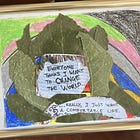


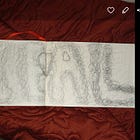
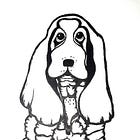


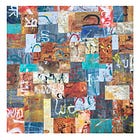
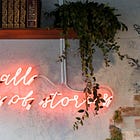

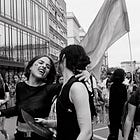


The reason I have trouble putting myself out there is that I've always been rather introverted, painfully shy, and just not confident that people want what I make. (I don't sell very much, to be honest.)
I also didn't like to bother people. I get that from my mom. So for me, networking, putting myself out there is a real struggle. I do it anyway, with mixed results.
Thanks for the shout-out!